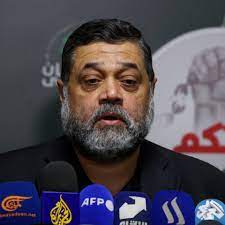Hamas’ acting Gaza chief Khalil al-Hayya declared Wednesday the militant group would not engage in any hostage-for-prisoner exchanges with Israel unless the war in Gaza ends, highlighting the deepening impasse in efforts to resolve the conflict.

“Without an end to the war, there can be no prisoner swap,” al-Hayya stated in an interview with Hamas’ Al-Aqsa television. “How would a sane or an insane person lose a strong card he owns while the war is continuing?”
The statement came hours after the United States vetoed a United Nations Security Council resolution calling for an unconditional permanent ceasefire. U.S. Ambassador to the UN emphasized that Washington would only support measures explicitly demanding the immediate release of Israeli hostages as part of any ceasefire agreement.
Al-Hayya, who has led Hamas’ negotiating team in discussions with Qatari and Egyptian mediators, placed blame for the stalled talks on Israeli Prime Minister Benjamin Netanyahu. During a Tuesday visit to Gaza, Netanyahu maintained that Hamas would be stripped of power in the enclave and offered $5 million rewards for each of the 101 hostages believed remaining in captivity.
Qatar, a key mediator alongside Egypt, has threatened to suspend its diplomatic efforts unless both parties demonstrate genuine commitment to reaching an agreement. The Gulf state recently clarified that Hamas’ political office in Doha remains operational, contrary to reports of U.S. pressure for its closure.
In a potentially significant development, al-Hayya revealed Hamas’ receptiveness to an Egyptian proposal for joint administration of Gaza with rival Fatah movement, led by Palestinian President Mahmoud Abbas. However, Israel has rejected any postwar role for Hamas and expressed skepticism about Abbas’ Palestinian Authority assuming control.
The conflict, triggered by Hamas’ October attack that killed 1,200 Israelis and took over 250 hostages, has resulted in unprecedented devastation in Gaza. The Hamas-run health ministry reports nearly 44,000 Palestinian deaths and over 103,000 wounded, with millions facing severe humanitarian crises amid widespread destruction.



